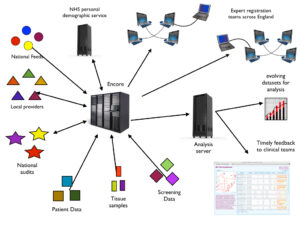We’re at an exciting time for cancer registration information, taking one step towards a single national cancer registration system. In November, the data from the last of our regional cancer registries was brought into the single processing system, Encore, at last creating a single National Cancer Registration Service (NCRS) in England.
The migration of the original regional cancer registries has been much more than a rollout of a new data processing system. Built by a team of six, run by a staff of 200, every month the system manages hundreds of thousands of records taken from hundreds of sources. Achieving this unified service meant creating new roles and changing processes and practice across all the eight regional cancer registries. It was all by our own staff and within the existing budget for the Service, too. Truly an IT project for the NHS to be proud of!
I talked about this development in June last year at the Cancer Outcomes Conference. Delivering complex data streams and turning them into timely, high-quality data and analysis to help clinicians, researchers and commissioners to understand every aspect of the cancer care pathway will help us make a move from cancer treatment towards cancer prevention.
What this will do for cancer research will help speed up work to deliver personalised cancer medicine to patients in the future, which can only help us improve earlier diagnosis and identify the most appropriate treatment sooner to positively impact outcomes. It will be the first time cancer specialists have instant access to clinical data, including the way tumours respond to different types of treatment. It also tracks how each sub-type of cancer responds to different treatments, helping doctors target genetic mutations with a new generation of drugs designed to work most effectively on relatively small numbers of patients.
Below are some of the key advances the NCRS will deliver:
- Collect near-real-time data on all cancers diagnosed in England population of 52 million people
- Receive data from 12 national feeds and more than 500 local systems, including around 1,700 weekly multidisciplinary team meetings (MDT) from all 162 acute trusts and a range of private providers
- Process over 200,000 records each month including pathology reports, patient administration, imaging and MDT information
- Include details of treatments, including radiotherapy and surgery, and provide links to all three cancer-screening programmes
- Include molecular test results from the specialist laboratories and incorporate the entire extended dataset from the first phase of the Cancer Research UK Stratified Medicine Programme
As part of these advances we've also piloted a scheme called The Patient Portal, with support from charities the BrainsTrust and Cancer Research UK, which offers individual patients access to their own information. We also produce an online tool called ‘Predict’, which allows clinicians and patient to assess the benefits of different types of breast cancer treatment. This is a fantastic advancement that empowers patients with information about their conditions and along with the doctor, helps them decide the treatment path to continue to take.

